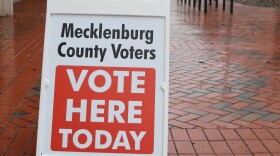Danielle Brown said she and other North Carolina voters are tired of what seem like continuous changes to state elections law.
"Now we have to go back and we have to let people know 'You need an ID,'" Brown said with exasperation.
The state Supreme Court, with a newly elected Republican majority, reversed major rulings from last year issued by the court's previous majority of Democratic justices.
In response to filings by members of the North Carolina General Assembly's GOP majority, the high court reinstated a photo ID requirement for voting. The Republican-majority court once again made it unlawful for people on probation for felonies to regain their voting rights until all terms of their sentences are completed.
Brown is deputy national field director of the group Black Voters Matter. She and other civil rights activists gathered in Raleigh on Wednesday to protest two GOP measures. One bill would require mail-in ballots to arrive by the close of polls on Election Day; another would give lawmakers appointment power over the state elections board.
Brown's group had been headed to Salisbury, N.C., to do voter outreach when they altered their plans and diverted their tour bus to the capital instead for a hastily arranged protest of the latest GOP legislation.

Less than two years ago, Governor Roy Cooper, a Democrat, vetoed another Republican bill that also would have eliminated the grace period for mail-in ballots. But legislative Republicans are taking up the issue again now that they hold a veto-proof super-majority.
Brown expressed concern that the constant flux in state election laws will lower voter turnout.
"It pulls on the people," she said. "It pulls on the aspect of how we turn out, it pulls on the aspect of how we actually generate and give information to our folks."
But Republican Senator Paul Newton, co-chair of the Redistricting and Elections Committee, said he trusts North Carolina voters to adapt if they're informed of a change to the deadline.
"We don't see that as invalidating any votes," Newton said in Wednesday's committee meeting. "People just need to adjust."
And Newton pointed out that most states — 30, according to the National Conference of State Legislatures — set Election Day as the deadline for receiving absentee-by-mail ballots.
Senator Natasha Marcus disagreed, however, that eliminating the grace period was a simple scheduling change. The Mecklenburg County Democrat called it "un-American" to change the deadline and force people who rely on mail-in voting — such as elderly and disabled people, and students — and would otherwise have until Election Day to get their ballots in, to rush their decisions.
"Things change, news breaks, people change their minds, information comes to light at the very last minute," Marcus said.
And Democrats accuse Republicans of an unconstitutional power grab with their bill to reconstitute the elections board.
Now, it's a five-member body, where governors get to appoint a potentially tie-breaking fifth member from their party. The GOP bill would make it an eight-member body with two members each appointed by the House and Senate minority and majority leaders.
But the new measure would send deadlocked votes on appointing an elections board chairman and executive director to the legislature.








